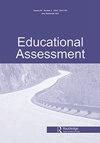Identifying Problem-Solving Solution Patterns Using Network Analysis of Operation Sequences and Response Times
IF 2.3
Q1 EDUCATION & EDUCATIONAL RESEARCH
引用次数: 0
Abstract
ABSTRACT Process data from educational assessments enhance the understanding of how students answer cognitive items. However, effectively making use of these data is challenging. We propose an approach to identify solution patterns from operation sequences and response times by generating networks from process data and defining network features that extract essential information from them. With these features, we group respondents to a problem-solving task from PISA 2012 using Gaussian mixture models. The results indicate the presence of two and four clusters for groups defined by failure and success on the task, respectively. We interpret the clusters as less-able, low-effort, adaptable, back-and-forth, deliberate, and trial-and-error clusters by considering the cluster-specific feature statistics. The proposed approach sheds light on students’ problem-solving mental processes, which can aid item development and facilitate individualized feedback to students. The method is applicable to many computer-based problems, but a limitation is that the feature definitions can be task-dependent.使用操作序列和响应时间的网络分析识别问题解决方案模式
摘要教育评估的过程数据有助于加深对学生如何回答认知项目的理解。然而,有效利用这些数据具有挑战性。我们提出了一种方法,通过从过程数据中生成网络并定义从中提取基本信息的网络特征,从操作序列和响应时间中识别解决方案模式。有了这些特征,我们使用高斯混合模型对2012年PISA问题解决任务的受访者进行分组。结果表明,对于分别由任务失败和成功定义的组,存在两个和四个集群。通过考虑集群特定的特征统计,我们将集群解释为能力较弱、工作量较小、适应性强、来回、深思熟虑和反复尝试的集群。所提出的方法揭示了学生解决问题的心理过程,这可以帮助项目发展并促进对学生的个性化反馈。该方法适用于许多基于计算机的问题,但其局限性在于特征定义可能与任务有关。
本文章由计算机程序翻译,如有差异,请以英文原文为准。
求助全文
约1分钟内获得全文
求助全文
来源期刊

Educational Assessment
EDUCATION & EDUCATIONAL RESEARCH-
CiteScore
3.20
自引率
6.70%
发文量
24
期刊介绍:
Educational Assessment publishes original research and scholarship on the assessment of individuals, groups, and programs in educational settings. It includes theory, methodological approaches and empirical research in the appraisal of the learning and achievement of students and teachers, young children and adults, and novices and experts. The journal reports on current large-scale testing practices, discusses alternative approaches, presents scholarship on classroom assessment practices and includes assessment topics debated at the national level. It welcomes both conceptual and empirical pieces and encourages articles that provide a strong bridge between theory and/or empirical research and the implications for educational policy and/or practice.
 求助内容:
求助内容: 应助结果提醒方式:
应助结果提醒方式:


